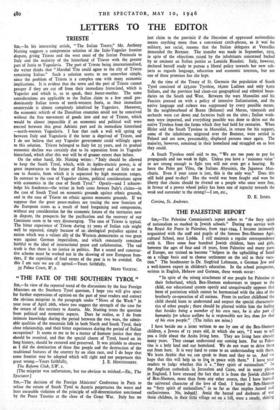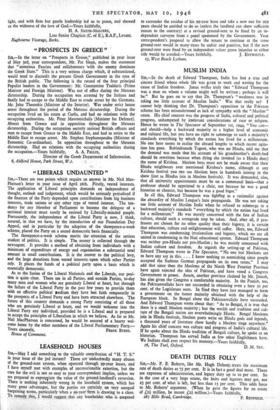THE PALESTINE REPORT
Sin,—The Palestine Commission's report refers to " the fiery spirit of nationalism so marked in Jewish schools." During my service with the Royal Air Force in Palestine, from 1941-1944, I became intimately acquainted with the staff and pupils of the famous Ben-Shemen Agri.% cultural School, near Lydda. I still maintain a regular correspondence with it. Here some four hundred Jewish children, boys and girls, between the ages of four and 18 years, from Palestine and many parts of Europe, are trained to become "helpers in the upbuilding of Israel on a village basis and to choose settlement on the soil as their voca- tion." The headmaster is Dr. Siegfried Lehmann, a German Jew and a well-known expert in children's education. In the school prospectus, written in English, Hebrew and German, these words occur:
"In spite of the strong attachment of our people for Palestine as their fatherland, which Ben-Shemen endeavours to impart to the child, our educational system openly and unequivocally opposes that form of patriotism which cannot be harmonised with the idea of the brotherly co-operation of all nations. From its earliest childhood the child should learn to understand and respect the special characteris- tics of other people ; there should be planted within him the feeling that besides being a member of his own race, he is also part cf humanity for whose welfare he is responsible not less than for that of his own people." (The italics are mine.)
I have beside me a letter written to me by one of the Ben-Shemen children, a Jewess of 12 years old, in which she says, "I want to tell you a little about the Arabs living here. They are living here already many years. They cannot understand our coming here. For us Pales- tine is a holy land and our homeland. We do not want to drive them out from here. It is very hard to come to an understanding with them. We learn Arabic that we can speak to them and they to us. And v.e hope that this will help us to livi in peace with them." I leave your readers to judge whether this is a "fiery spirit of nationalism." In the Anglican cathedrals in Jerusalem and Cairo, and in many places in England, I have stressed the fact that it is from the Jewish children of Ben-Shemen, more than from any other source, that I have learned the universal character of the love of God. I found in Ben-Shemen no "fiery spirit of nationalism," in so far as that implies hatred and exclusiveness. No, indeed! Amid the hatred and darkness of war those children, in their little village set on a bill, were a steady, shining
light, and with firm but gentle leadership led us to peace, and showed us the wideness of the love of God.—Yours faithfully,
H. A. SMITH-MASTERS,
Late Senior Chaplain (C. of E.), R.A.F., Levant. Hagbourne Vicarage, Berks.



























 Previous page
Previous page